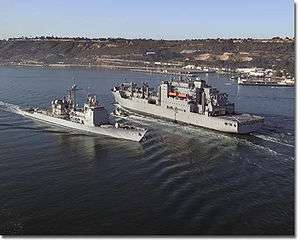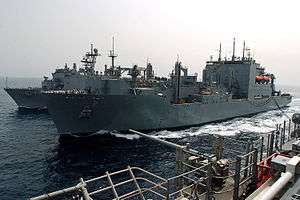USNS Sacagawea (T-AKE-2)
 Sacagawea (right) passing USS Mobile Bay (CG-53) | |
| History | |
|---|---|
| Name: | USNS Sacagawea |
| Namesake: | Sacagawea |
| Ordered: | 18 October 2001 |
| Builder: | National Steel and Shipbuilding |
| Laid down: | 15 September 2004 |
| Launched: | 24 June 2006 |
| In service: | 27 February 2007 |
| Homeport: | Norfolk, Virginia |
| Motto: | Leading the Way |
| Status: | in active service |
| General characteristics | |
| Class and type: | Lewis and Clark-class cargo ship |
| Displacement: |
|
| Length: |
|
| Beam: |
|
| Draft: |
|
| Propulsion: | Integrated propulsion and ship service electrical system, with generation at 6.6 kV by FM/MAN B&W diesel generators; one fixed pitch propeller; bow thruster |
| Speed: | 20 knots (37 km/h) |
| Range: |
|
| Capacity: |
|
| Complement: | 49 military, 123 civilian |
| Electronic warfare & decoys: | Nulka decoy launchers |
| Armament: |
|
| Aircraft carried: | two helicopters, either Sikorsky MH-60S Knighthawk or Aerospatiale Puma |
USNS Sacagawea (T-AKE-2), a Lewis and Clark-class dry cargo ship, was the third ship operated by the United States Navy to be named for Sacagawea, the Shoshone woman who acted as guide and interpreter for the Lewis and Clark Expedition, and one of the few United States Navy ships named for women.
The contract to build her was awarded to National Steel and Shipbuilding Company (NASSCO) of San Diego, California, on 18 October 2001. Construction began in September 2004 for a scheduled delivery in early 2007.
She was launched in June 2006. Two of Sacagawea's descendants, Lucy Diaz and Rachel Ariwite, were the ship's sponsors. USNS Sacagawea is one of 14 Lewis and Clark class dry cargo ship and is part of the 14 ships that comprise the United States Marine Corps Maritime Prepositioning Program.
In January 2013, USNS Sacagawea was transferred to the Maritime Prepositioning Squadron Three (MPSRON-3) in Saipan. Within days of her arrival, she participated in Exercise Freedom Banner in the Republic of the Philippines. Freedom Banner is the only annually funded Maritime Prepositioning Force exercise in the Marine Corps and continues to be a proving ground for concept validation.
During Freedom Banner 13, the Marine Air Ground Task Force (MAGTF) used both vertical connectors in the form of MV-22 Osprey aircraft,[1] and surface connectors in the form of landing craft, utility (LCU), and landing craft, mechanized, “Mike 8” (LCM-8) boats loaded aboard USNS Lummus. These dedicated ship-to-shore connectors not only enabled the standup of the MAGTF, but also provided sustainment to exercise forces ashore during the conduct of the exercise.[2]
This vessel is the only USNS Sacagawea. However, other U.S. Navy vessels have been named USS Sacagawea.

References
Based on data from the Naval Vessel Register and press releases.
Notes
- ↑ Peacock, PFC Kasey. "Pilots conduct first external lift from USNS Sacagawea". Retrieved 30 May 2013.
- ↑ Barber, Major Robert G. (June 2013). "Open For Business: Operational Employment of the MPF". Marine Corps Gazette. 97: 23–26. Retrieved 30 May 2013.
External links
| Wikimedia Commons has media related to USNS Sacagawea (T-AKE-2). |
- Official website of USNS Sacagawea
- nvr.navy.mil: USNS Sacagawea
- msc.navy.mil: USNS Sacagawea
- navsource.org: USNS Sacagawea
- navysite.de: USNS Sacagawea